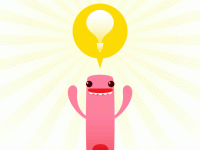Good-to-Go Projects for 2014
When teachers ask how to get started with project-based learning, I acknowledge the "front-loading" that's part of project planning. Before students enter the picture, teachers need to consider the learning goals of a project, develop an assessment plan, and map out at least a rough calendar of the learning activities that will support the inquiry process. Those details may change once students dig in, but having a plan provides a roadmap for the student-directed learning ahead.
Starting with a ready-made plan that you can adapt to fit your context can help you and your students get off to a faster start with PBL. With that in mind, here are some good-to-go project ideas for 2014.
The Happiness Project
Is your community a happy place? How can you tell? Which measurable factors contribute to the happiness of society? How might you boost the happiness level in your community or around the globe?
These are among the intriguing questions that students will explore in a global investigation of happiness in 2014. The Global Happiness Project is a collaborative learning experience designed by PBL experts at the New Tech Network, but open to any interested teachers and students around the world.
Here's the big idea:
Through the Global Happiness Project, students will engage in a virtual conversation about the components of a happy society, and will co-design and implement a survey to measure these components at the local and global level. Later, students will analyze the results of this survey and use what they have learned to inform an advocacy project designed to improve at least one area of happiness at the local or global level.
The project is adaptable across subject areas and grade levels. It's easy to imagine how this project could address learning goals for social studies and math/statistics. For example, to fire up students' thinking, the project uses Bhutan's Gross National Happiness Index as a resource to help students design their own surveys. At the solution stage, students are likely to tap creativity, innovative thinking, and digital media smarts to develop and pitch happiness proposals.
Check out the project description and resources, and fill out a form to indicate interest. The project officially kicks off January 27 and continues through May, when students will advocate for their solutions to make the world-or just their corner of it-a happier place.
The Story of Statistics
What would the world be like if the Normal Curve had never been discovered? Can you imagine an alternate reality where our understanding of the world was governed by chance events instead of statistical analysis?
That's the curious starting point for The Taming of Chance, a math-meets-sci-fi project dreamed up by the Fields Institute for Research in Mathematical Sciences and the American Statistical Association.
Here's the big idea:
People first started talking about the Normal Distribution nearly 300 years ago. The scientific community used their understanding of the Normal Curve to model and give meaning to the results of their experiments, which weren't always easy to see. Today, we owe much of our modern technology and modern world to the discoveries made possible by the Normal Curve. Could you imagine your life without a cellphone, or without the Internet? Could you imagine a world without safe cars? Could you imagine a world without vaccines, or a world where the medicine is as dangerous as the disease? This story competition asks you to tell a story that happens in this alternative reality.
The project challenges students to create stories in any medium -- from short stories to films -- that will engage their thinking about statistics. Student can expect an authentic audience for their work, with judges set to award $3,000 in cash prizes. Team entries are encouraged. Sounds like an ideal project for interdisciplinary collaboration (i.e., teaming up math or science with language arts or digital media).
Project organizer Charles Anifowose explains why students need a deeper understanding of concepts like the Normal Curve: "There are some key ideas which remain inaccessible to most people outside the statistics profession. These ideas are currently being used to determine government policy and guide multi-billion dollar investment funds, but they also relate to how we live and make decisions every day." By engaging students through the compelling medium of story, The Taming of Chance aims to turn the study of statistics into a learning adventure.
Projects to Build Global IQ
Are your students acquiring the knowledge and developing the skills that will enable them to work, live, and serve in an increasingly connected world? Are you looking for PBL experiences that will help your students develop their Global IQ?
New Global Citizens offers a starting place for projects that put students in the role of advocates for world-changing ideas. Project ideas focus on a range of hot topics, from gender equality to extreme hunger to natural disasters. Many projects relate to United Nations Millennium Development Goals.
New Global Citizens connects students with grassroots programs working to address these challenging issues in communities around the world. For example, students concerned about the removal of land mines in Africa can become advocates for an innovative organization called Apopo, which trains HeroRats to sniff out mines.
You can this map to search for grassroots projects that your students might want to support through advocacy or community education. Detailed curriculum resources, aligned to the Common Core State Standards, are available (for a fee) for grades 6-12.
For another source of global projects that are ready to join, check out the spring offerings from the Center for Innovation in Science and Engineering Education. Through CIESE, students from multiple locations team up to gather and analyze data about topics such as human genetics, water quality, or schoolyard habitats.
What's on your PBL calendar for 2014? Are you designing projects that other classrooms can join? Please share details and updates in the comments.
